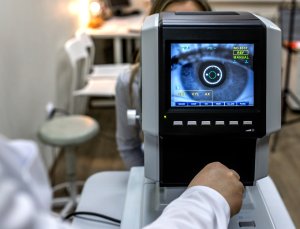Information About Cataracts

Voted Best of Berks—
eight years in a row!
A careful exam is the first step to discovering cataracts or ruling out another condition that may be causing your eye problems. Get more information and answers to your questions from the cataract specialists at Eye Consultants of Pennsylvania.
The skilled team of board certified cataract specialists at Eye Consultants of Pennsylvania has undergone extensive training at some of the world’s most prestigious hospitals and universities and bring you years of experience.
- Meet Adam J. Altman, MD
- Meet Y. Katherine Hu, MD
- Meet Lawrence E. Kenney, MD
- Meet Christina Lippe, MD
- Meet Michael A. Malstrom, MD
- Meet Mehul H. Negarsheth, MD
- Meet Abhishek K. Nemani, MD
- Meet Jonathan D. Primack, MD
- Meet Kevin J. Shah, MD
Our doctors use very specialized equipment in conjunction with their years of training to examine your eyes and check for the presence of cataracts. If you have symptomatic cataracts, your doctor will discuss with you the health of your eyes, how your cataracts are affecting your vision, and what treatment options are available.
Frequently Asked Questions about Cataracts (FAQs)
What is a Cataract?
A cataract is a clouding of the lens inside the eye. The lens of the eye is made up mostly of water and protein. This protein works to keep the lens clear and transparent, allowing light to pass through the eye to the retina, where the images that we see are formed.
As we age, the protein may begin to clump together and cloud over a small area of the lens. This is called an age-related cataract. It may be mild, moderate, or severe. As time goes on, the cataract may cloud more of the lens. It may also become denser or more opaque, making it difficult for us to see clearly.
What are the Symptoms of a Cataract?
These symptoms and vision changes may be a sign of a cataract:
- Cloudy, blurry or distorted vision
- Light sensitivity
- Glare and halos around bright lights
- Increasingly poor night vision
- Frequent changes in eyeglass or contact lens prescription
- Fading or yellowing of colors that were once vivid
- Double vision in one eye
You may also notice that you blink more than usual to try to clear your blurry vision, or that you need more light to complete tasks that you were once able to do with normal light levels.
How are Cataracts Treated?
The only way to eliminate a cataract and restore your clear vision is through cataract surgery, during which the cloudy natural lens of the eye is removed and replaced with a clear artificial lens called an intraocular lens implant (IOL). Unlike a contact lens, it is placed permanently inside your eye. It cannot fall out, does not need to be cleaned, and you will not even notice that it’s there.
Most cataract surgeries today are performed using ultrasound (high frequency sound waves) to soften the cloudy lens, remove it through a tiny incision, and replace it with an artificial intraocular lens (IOL). In most cases, no stitches are required because the self-sealing incision is so small. And, because there are no uncomfortable stitches to care for, there are fewer post-surgery restrictions on your activities.
If you have other questions about what causes cataracts, suspect you may have a cataract, or would like more information about cataract surgery, get in touch with Eye Consultants of Pennsylvania to schedule an evaluation. We serve patients throughout Wyomissing, Pottsville, Pottstown, Lebanon and Blandon, PA.
Find a Doctor
Physician information including education, training, practice location and more.
Schedule an Appointment
Call 800-762-7132 or make an appointment online.





